In our previous blog post we had discussed about What are Email Alerts in Salesforce. In these blog post we discuss about Lightning Email Templates in Salesforce
Contents
Lightning Email Templates in Salesforce
What Are Lightning Email Templates
Lightning Email Templates are reusable email layouts in Salesforce that allow users to communicate with prospects, customers, and internal teams efficiently. Unlike Classic Email Templates, Lightning versions offer more customization and a better interface, making them particularly useful for organizations wanting visually appealing emails with robust functionality.
Advantages of Using Lightning Email Templates
Using Lightning Email Templates offers several advantages:
- Efficiency: Templates save time by eliminating the need to write each email from scratch.
- Consistency: Standardized templates ensure messaging is aligned with brand guidelines.
- Improved User Experience: The modern, user-friendly interface in Salesforce Lightning makes creating and managing templates easy for users at all levels.
Setting Up Lightning Email Templates in Salesforce
To start using Lightning Email Templates, you’ll need to have the right permissions. Once set, navigate to the App Launcher and find “Email Templates.” Select “New Email Template” to create your first template. Salesforce administrators usually handle permissions, so check with them if access issues arise.
Creating a Basic Lightning Email Template
Login to Salesforce Account
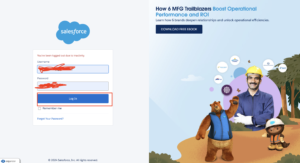
Click gear icon Navigation to Setup
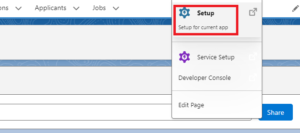
Search Quick find box Email Templates
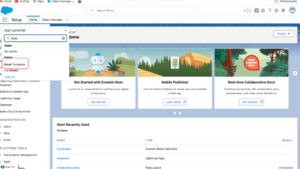
Click New Templates
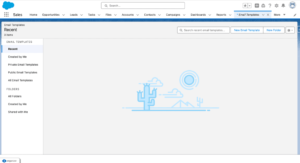
Fill required fields
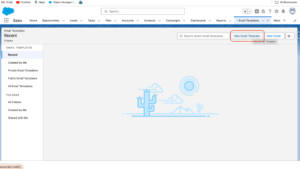
Use drag and drop
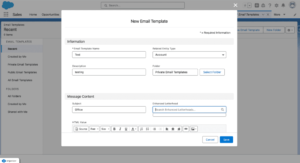
Click next block Select Merge Field
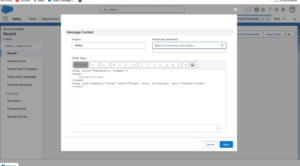
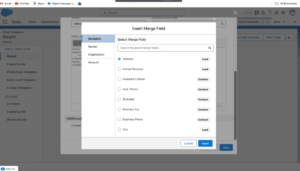
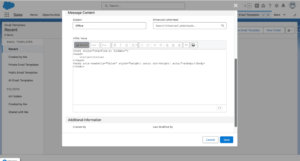
Click Save Button
Customizing Your Lightning Email Template
To personalize your emails, you can add custom fields and dynamic content. Salesforce’s merge fields feature allows for inserting personalized information (e.g., first names or company names) directly into the template, creating a tailored experience for each recipient.
Formatting Tips for Lightning Email Templates
Good formatting makes your emails visually appealing and easy to read. Consider these tips:
- Add Images and Logos: Visuals enhance engagement.
- Use Bullet Points: Make content scannable.
- Include Links: Provide easy access to important resources.
Utilizing Merge Fields in Lightning Email Templates
Merge fields allow for automatic insertion of data, such as customer names or account information, into your emails. For example, you might use a merge field for a first name ({{Contact.FirstName}}), so emails feel personal and relevant. This feature helps in maintaining professionalism without extra manual effort.
Using Lightning Email Templates in Automated Workflows
One powerful feature of Lightning Email Templates is their integration with Salesforce automation. Templates can be used within workflows and processes, making it easier to automate routine communications, like sending welcome emails or updates.
Best Practices for Lightning Email Templates in Marketing
For marketing, use Lightning Email Templates to create personalized, action-oriented emails that encourage customer engagement. Focus on crafting compelling subject lines, using eye-catching visuals, and including clear calls-to-action (CTAs) to drive conversions.
Testing and Reviewing Lightning Email Templates
Before deploying your templates, thoroughly test them. Salesforce allows you to preview templates and even send test emails to verify that all merge fields populate correctly and that formatting looks good across devices.
Deploying Lightning Email Templates Across Teams
To maximize efficiency, share your templates across teams. Salesforce makes it easy to organize templates into folders, manage access, and control permissions, ensuring everyone in the organization can use the templates they need without risking unauthorized changes.
Common Issues with Lightning Email Templates and Solutions
Some common issues include merge fields not displaying correctly or formatting inconsistencies. Ensure that merge fields match Salesforce’s syntax and avoid excessive custom styling to prevent compatibility issues. Always test templates to catch and correct these issues early.
Migrating from Classic to Lightning Email Templates
If you’re using Classic Email Templates, consider upgrading to Lightning for enhanced functionality. Salesforce offers tools to help with migration, but it’s essential to review each template post-migration to ensure everything looks and functions as expected.
Conclusion
Salesforce Lightning Email Templates are invaluable for teams looking to communicate efficiently and effectively. With customizable options, the ability to integrate into workflows, and ease of use, these templates help organizations save time, maintain brand consistency, and engage customers better. Adopting Lightning Email Templates can transform your communication strategy and enhance overall productivity.
We want to more about Lightning Email Templates in Salesforce Click Here
FAQs
How can I edit a Lightning Email Template?
You can edit a Lightning Email Template by navigating to the template, selecting it, and clicking “Edit.” Make sure you have the required permissions to make changes.
Are Lightning Email Templates available in all Salesforce editions?
Lightning Email Templates are generally available in most Salesforce editions that support the Lightning Experience.
What permissions are needed to create email templates?
Users need appropriate permissions, typically assigned by a Salesforce admin, to create and edit email templates.
Can I use custom images in Lightning Email Templates?
Yes, you can add images to Lightning Email Templates by uploading them directly or linking to an image URL.
How do I switch back to a Classic Email Template?
If you prefer the Classic template, you can navigate to Classic Email Templates in Salesforce. However, switching templates may limit some Lightning-specific features.
In our next blog post we will discuss about Mail Merge Templates in Salesforce








Add comment